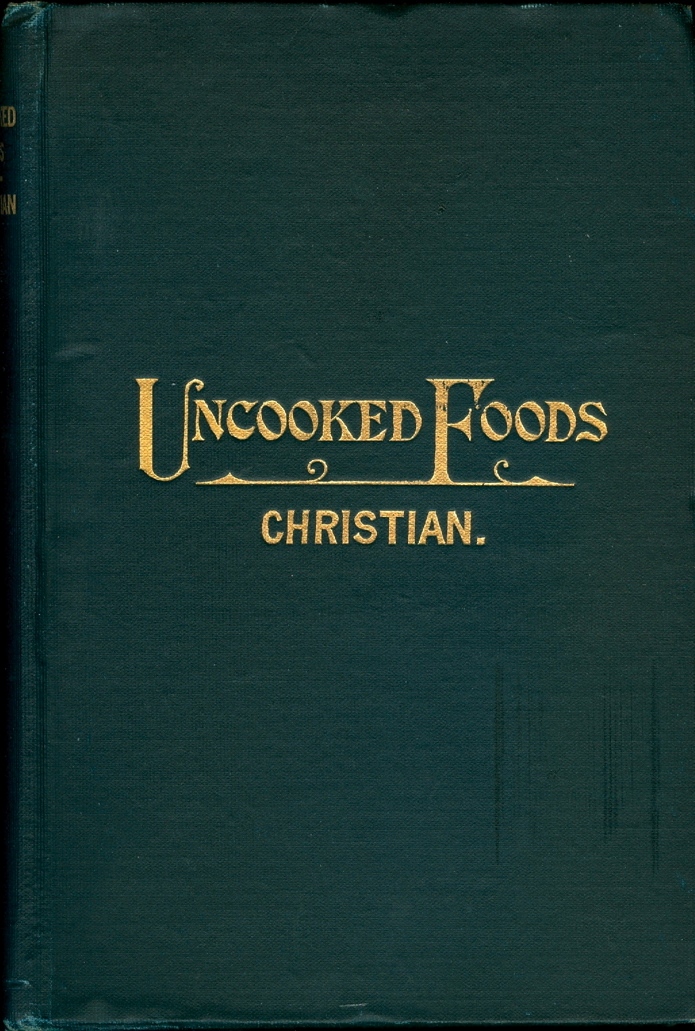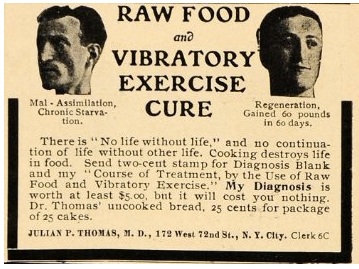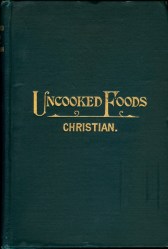Americans have a long tradition of dreaming up radical ideas for uber-healthy diets and trying to convince other people that their lives and bodies will be transformed if they just change what they’re putting in their mouth. The country’s first raw food restaurant opened in Los Angeles in 1917 and stayed open for 25 years. There were certainly some people who promoted these ideas potential profit, like Julian P. Thomas, M.D.:
But there were also people who had a more missionary zeal for their discoveries, like Eugene and Mollie Griswold Christian, the authors of Uncooked Foods & How to Use Them: A Treatise on How to Get the Highest Form of Animal Energy From Food. The book was originally published in 1904 by New York’s Health & Culture Company, and a fifth-edition copy is currently available from the rare-books dealer Rabelais. There’s “a bit of spotting to the publisher’s gilt stamped dark blue boards,” but the book, which is going for $90, is “otherwise near fine.” Check it out:
Also, it’s incredibly fun to read.
The Christians make a lot of the same arguments for healthy living and raw food that you hear today. Only they make them in turn-of-the-century style. Raw food, for instance, is good because God made it that way:
They have been finished by nature, by some supreme intelligence, and sown with prodigal hand over the face of the earth, and man has become the beneficiary thereof. And none of his work and puny efforts can possibly improve them.
Or, here’s their argument against coffee, tea, and tobacco:
A being who subsists upon clean, elementary foods would have no more desire for stimulants and narcotics than a horse or a dog would have for a Manhattan cocktail.
But there are also wonderful differences between a 1904 raw food treatise and one you might read today. For instance, one of the main arguments they make for a raw food diet is that it liberates women from the drudgery of housework:
When … the woman who has dreamed a true home is settled therein, it gradually dawns upon her that instead of being a queen, she is an imprisoned vassal. … She soon realizes that the fires of the morning are hardly out until those for the noon are kindled … [the dish-rag] waves over her helpless head as an insight of her rank and profession, under which she is really a slave.
But raw food will save her. “It is from this deplorable condition of womankind that the use of uncooked or natural foods will surely bring relief and freedom,” they write.
The Christians are really into dairy. They love egg-nog and fruits with thick cream. And, although they don’t really recommend eating meat, they’re OK with it — as long as it’s raw, as “it is admitted by all authorities that rare meats are more easily digested and far more nutrients than those well done.” (Worried about needing heat to kill germs? You shouldn’t be eating things with germs in the first place, DUH, say the Christians.) The book includes recipes for beef tartare and chipped beef in (of course) cream.
Sarah Lohman, who writes about historic gastronomy at Four Pounds Flour, actually followed the Christians’ seven-day meal plan for a week. And, she said, she felt great:
Despite my kvetching, I’ve been generally very satisfied with my meals. The food is good and fresh, and extremely healthy while remaining delicious. I feel full at the end of a meal … Compared to other historic diets I’ve been on, this one is a breeze.
She says she developed a “new-found love for cabbage” but was not particularly fond of the no-bake biscuits, which she called “miserable little things … less edible than silly puddy.” The raw food diet did work its magic on her digestive system, though: “I’ve got bowels John Harvey Kellogg would be proud of,” she wrote at the end of the experiment.
Our recommendation: Buy it, slather it in cream, and read it while you munch your steak tartare.






